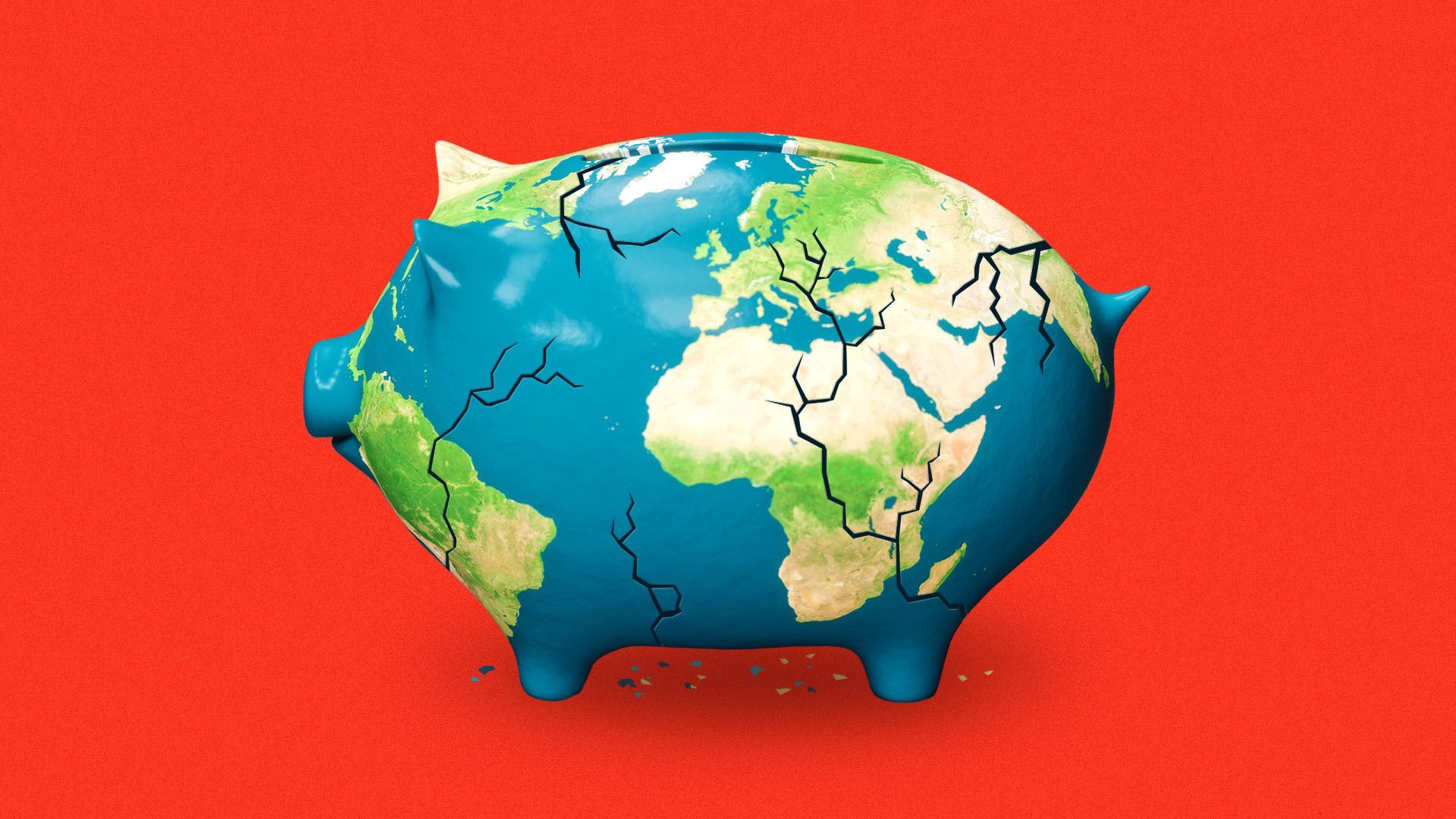| | | | | | | | | | | Axios Generate | | By Ben Geman and Andrew Freedman · Jul 08, 2022 | | 💃🏽🕺Hello Friday. Today's newsletter, edited by Mickey Meece, has a Smart Brevity count of 1,078 words, 4 minutes. 🚨 Treasury boss Janet Yellen's upcoming Asian travel will seek to "build momentum for a complex effort to cap prices for Russian oil." (Bloomberg) 🎶 And happy birthday (it's Sunday) to Neil Tennant of the synth-pop craftsmen the Pet Shop Boys, who have this week's final intro tune... | | | | | | 1 big thing: Biden's tough climb on transportation emissions |  | | | Illustration: Sarah Grillo/Axios | | | | White House efforts to slash carbon emissions from cars and trucks face hurdles even as team Biden rolls out new efforts to make transportation more climate-friendly, Ben writes. Driving the news: The Transportation Department just floated draft rules aimed at forcing states to set carbon-cutting targets that would be tracked by federal officials. It's the latest — but hardly the most ambitious — in a wider set of climate initiatives around transportation. Why it matters: Transportation is the nation's largest source of planet-warming emissions. But Capitol Hill and regulatory efforts face pitfalls. State of play: Proposals to greatly expand tax credits for buying electric vehicles appear in jeopardy in talks to revive President Biden's wider social and energy spending plan. - Sen. Joe Manchin (D-W.Va.), per the Washington Post, argues that expanded incentives could be a handout for wealthy buyers. One potential compromise could involve means-testing, it reports. Politico also reports they could be cut.
- The talks come as Tesla, GM and Toyota have hit the per-manufacturer cap, with more automakers en route. "For any lasting super-positive impact on demand, credits must be extended," Evercore ISI analyst Chris McNally said in a note, per Axios' Nathan Bomey.
On the regulatory front, last week's Supreme Court decision limiting EPA's authority on power plant emissions could influence legal fights over the agency's pending vehicle CO2 standards, E&E News reports. While the piece suggests EPA can withstand those challenges, it also notes it could slow the efforts. The intrigue: The newly proposed Transportation Department rules could test whether even more modest regulatory efforts are now legally vulnerable. - Sen. Shelley Moore Capito, the top Republican on the Senate's environment committee, called it a "partisan" policy priority that Congress has not blessed.
- A spokesperson tells Axios the senator believes they're inconsistent with the high court ruling, while a highway industry trade group made the same case to the Washington Post.
The other side: Sen. Tom Carper (D-Del.), who chairs the Senate's environment panel, praised the rules and said they follow congressional intent to have DOT boost environmental performance. Zoom out: DOT said the rules complement $27 billion in the bipartisan infrastructure law to help states and metro regions make transport cleaner. "Our approach gives states the flexibility they need to set their own emission reduction targets," Transportation Secretary Pete Buttigieg said in a statement. |     | | | | | | Bonus: Why transportation matters |  Reproduced from Rhodium Group; Chart: Axios Visuals Transportation has overtaken electric power as the top U.S. source of greenhouse gas emissions. |     | | | | | | 2. Globe has third-hottest June, with severe heat waves |  Data: Copernicus Climate Change Service/ECMWF; Chart: Baidi Wang/Axios The world had its third-warmest June on record in a month characterized by extreme heat events from India and Pakistan to Europe and the southwestern United States, according to the Copernicus Climate Change Service, Andrew writes. Why it matters: The monthly data shows that despite the cooling influence of La Niña conditions in the tropical Pacific Ocean, human-caused climate change marches on. Zoom in: At 0.31°C (0.56°F) above the 1991-2020 average for the month, the month fell short of the top two warmest Junes, which occurred in 2019 and 2020. - Europe had its second-hottest June, with extraordinary heat waves smashing records from Spain, France and Italy to the Norwegian Arctic.
- Biarritz, France, and San Sebastián, Spain, set all-time high-temperature records in June, and extreme heat struck China, Japan and the Southwest U.S.
- Parts of Texas saw their hottest June temperatures on record, with more extreme heat gripping the region into early July.
- Such extreme heat waves are consistent with climate change. "Although exceptional, these events are not unexpected," Copernicus scientists stated in a special report, noting the clear ties to human-caused global warming.
Meanwhile, drought continues in much of the western U.S. and parts of Europe, and massive forest fires ignited during June and into early July across Alaska. - Europe is bracing for more potentially record-breaking heat next week, with heat alerts issued Friday for the U.K.
- Some computer models project all-time record heat in England next weekend, but uncertainty is high this far in advance.
|     | | | | | | A message from Axios | | Ready to go Pro? | | |  | | | | Join the hundreds of organizations Axios Pro delivers exclusive reporting and analysis in the same smart brevity format you know and love. Why it matters: We'll get you smarter, faster on everything happening across the climate industry. Don't get caught at an information disadvantage. Use code PRO200 at checkout to get $200 off your subscription. | | | | | | 3. Hints of EPA's post-SCOTUS power strategy |  | | | Illustration: Rebecca Zisser/Axios | | | | The New York Times has fresh reporting on EPA's approach to power plants in light of the Supreme Court's new constraints on the agency's climate power, Ben points out. Catch up fast: Back in March, even before the ruling, EPA head Michael Regan talked up tackling CO2 indirectly with rules that target other pollutants. What's new: Now the NYT's Lisa Friedman advances the ball... "One person familiar with the Biden administration's approach said the White House believes it can achieve economywide emissions reductions of as much as 40 percent below 2005 levels by the end of this decade by tightening regulations on traditional pollutants like mercury, acid gases and particulate matter." And her piece briefly notes how EPA could still regulate power plants' CO2. Ideas include not only include carbon capture but also "blending relatively cleaner fuels, like gas or hydrogen." Go deeper. |     | | | | | | 4. Banks falling short on climate risks |  | | | Illustration: Sarah Grillo/Axios | | | | Big European banks face "many deficiencies, data gaps and inconsistencies" in assessing climate risks despite some progress in their analyses, the European Central Bank said in a report Friday, Ben writes. What they found: The analysis of 104 banks finds that 60% "not yet have a well-integrated climate risk stress-testing framework." In addition, many banks are just at the early stages of weaving climate into their credit risk models, and "just 20% consider climate risk as a variable when granting loans," a summary notes. Threat level: "A sudden jump in carbon prices coupled with floods and droughts this year would lead to losses of at least 70 billion euros ($71.1 billion) for the euro zone's largest banks," Reuters' piece on the report notes. And the analysis finds, as their piece points out, that this estimate of credit and market risks only considers a subset of climate-related exposures. AP has more. The big picture: The report is part of wider global efforts to better understand financial institutions' exposure to physical risks and policy changes that weaken portfolios. U.S. banking regulators and the Fed are both increasingly active in the area, but nonetheless have not moved as quickly as European officials. |     | | | | | | 5. One tech thing: Electric seagliders |  | | | Regent's Viceroy concept would glide above the water, linking coastal communities. Image courtesy of Regent Craft | | | | All-electric "seagliders" could someday offer fast, low-altitude flights in coastal communities like the Hawaiian Islands, Axios' Joann Muller reports. Driving the news: Boston-based Regent is partnering with Hawaiian carrier Mokulele Airlines and investment firm Pacific Current to create a seaglider network in Hawaii. Service is expected to begin by 2025 with a fleet of 12-passenger Viceroy seagliders that will fly like pelicans, about 10 to 30 feet over the water, at speeds of up to 180 miles per hour. Read the whole story. |     | | | | | | A message from Axios | | Ready to go Pro? | | |  | | | | Join the hundreds of organizations Axios Pro delivers exclusive reporting and analysis in the same smart brevity format you know and love. Why it matters: We'll get you smarter, faster on everything happening across the climate industry. Don't get caught at an information disadvantage. Use code PRO200 at checkout to get $200 off your subscription. | | | | 📬 Did a friend send you this newsletter? Welcome, please sign up. Thanks for reading and have a great weekend. |  | | Why stop here? Let's go Pro. | | | | | | Axios thanks our partners for supporting our newsletters. If you're interested in advertising, learn more here.
Sponsorship has no influence on editorial content. Axios, 3100 Clarendon Blvd, Arlington VA 22201 | | | You received this email because you signed up for newsletters from Axios.
Change your preferences or unsubscribe here. | | | Was this email forwarded to you?
Sign up now to get Axios in your inbox. | | | | Follow Axios on social media:    | | | | | |
No comments:
Post a Comment